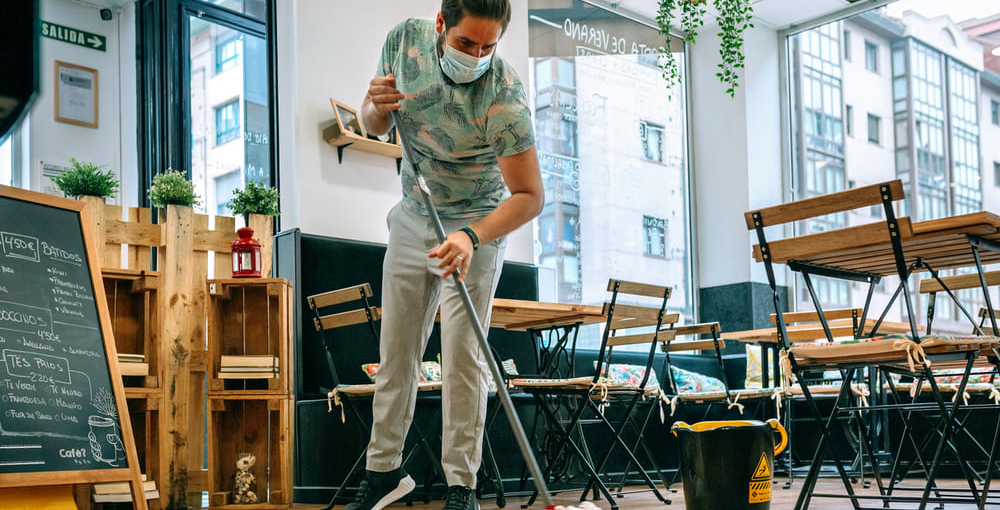If you’re working in the hospitality industry, or if you’re lucky enough to own your own restaurant, bar, or pub, you know how easy it is to get caught up in the hustle and bustle of the workday. As the time to open draws near or as you prepare to serve those last guests and begin closing duties, it may be tempting to rush past those steps that keep you and your employees and/or peers safe.
While safety procedures can sometimes feel tedious, the truth they are integral to running a successful and safe business. There’s a reason those within the hospitality industry came up with the following quote…
Safety isn’t expensive…it’s priceless.
That’s because not having proper safety protocols in place can lead to the injury of those in your employ and spell disaster for your establishment.
That’s why, as one of Sydney’s most trusted purveyors of wholesale hospitality furniture and accessories, we decided to share our top 4 safety tips to implement in your restaurant, bar, or pub. It’s an important topic and we’re excited to share them with you, so let’s dive in!
1. Proper Training is a MUST
You may have created an exceptional list of safety protocols and procedures for your establishment, but it means nothing if the people working for you are unaware of it.
It is critical that you have both general safety guidelines and specific safety procedures for certain areas of your establishment. Those in the kitchen should be properly trained on food and fire safety and maintaining the ventilation system. The front of the house should know how to safely escort guests out of the building in the event of a fire.
Training should be thorough and happen regularly to compensate for staff turnover.
2. Keep Floors Clean
Yes, clean floors are appealing to guests of your eatery…but they also keep customers and staff safe. Slips and falls (and the subsequent lawsuits) can devastate a business owner, so it is important to always maintain clean and dry floors.
Occasional spills should be cleaned and the surface dried immediately. Ideally, floors should be cleaned at the end of each shift. But debris and grime will build up even with daily cleaning, so you should plan a deep cleaning of floors and surfaces every quarter.
Do yourself a favor and create a cleaning schedule that employees can refer to and tackle daily cleaning during slower times throughout the day. This also helps staff coming in during the middle of the day to know what tasks have been completed and what still needs to be addressed.
3. Prepare for Emergencies
No one likes to think about emergency situations but having a plan for disasters is the best way to keep your staff and guests safe.
You should have an emergency action plan prepared. You can go fancy, creating a layout of your business using computer software, or it could be as simple as a printout of the building layout with arrows drawn right on the paper. Either option should make clear the nearest exits in each area of your building and show the quickest route to reach them. Your evacuation plan should be framed and mounted on the walls of your business.
It’s also important to make sure emergency exit routes always remain clear. The last thing you want during an emergency is guests and staff having to hurdle over unpacked boxes to get to safety.
Make sure that exits are clearly marked and that fire extinguishers are within easy reach. And it should go without saying that you or your manager should always know who is working so, in the event of an emergency, everyone is accounted for.
4. First Aid
Yes, we mentioned first aid in the training section of this article, but it’s important enough to deserve its own spot on the list. First aid training is essential for every employee, not just kitchen staff.
You should have a first aid kit on site that is accessible to every employee (behind the occasionally locked door of the manager’s office is not the best location). The kit should be large enough to include everything needed to treat cuts, burns, eye trauma, broken bones, and other injuries. First aid kits should be checked regularly so expired medications or items with broken seals can be replaced.
For information on what’s expected from you as a business owner, check out the government’s First Aid in the Workplace Code of Protocol.
And there you have it…four tips for keeping your employees and customers safe in the workplace. Taking the time to properly train your staff and maintain the safety of your business is an investment in your future that is worth making.

